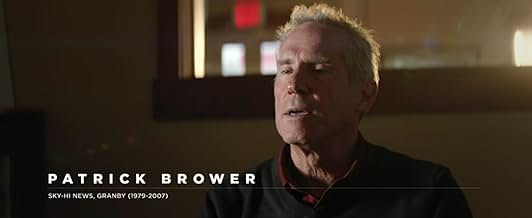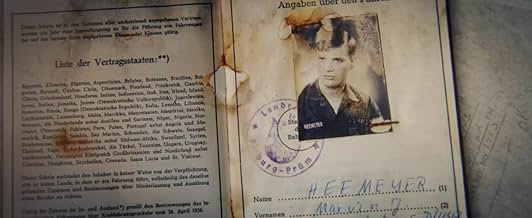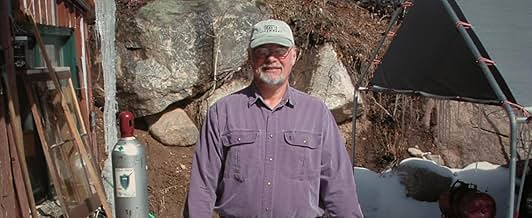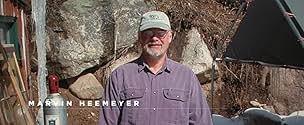Tread
- 2019
- 1h 29m
IMDb RATING
7.1/10
3.8K
YOUR RATING
Pushed to his breaking point, a master welder in a small town at the foot of the Rocky Mountains quietly fortifies a bulldozer with 30 tons of concrete and steel and seeks to destroy those h... Read allPushed to his breaking point, a master welder in a small town at the foot of the Rocky Mountains quietly fortifies a bulldozer with 30 tons of concrete and steel and seeks to destroy those he believes have wronged him.Pushed to his breaking point, a master welder in a small town at the foot of the Rocky Mountains quietly fortifies a bulldozer with 30 tons of concrete and steel and seeks to destroy those he believes have wronged him.
- Awards
- 1 nomination total
Marvin Heemeyer
- Self
- (archive footage)
Glenn Trainor Jr.
- Self - Grand County Undersheriff 1993 - 2004
- (as Glenn Trainor)
Cody Docheff
- Self - Owner, Mountain Park Concrete
- (archive footage)
Dick Thompson
- Self - Former Mayor of Granby, CO.
- (archive footage)
Ron Thompson
- Self - Vice President, Sewer District Board
- (archive footage)
- Director
- Writer
- All cast & crew
- Production, box office & more at IMDbPro
Featured reviews
Greetings again from the darkness. If not so tragic, this story might fit best in Ripley's Believe it or Not. What better description is there for a small town welder who builds an armored bulldozer, weaponizes it, and then takes it on a rampage of revenge, destroying the buildings, homes, and businesses of those he believe 'wronged' him? This actually happened in Granby, Colorado in 2004, and that welder's name was Marv Heemeyer.
Filmmaker Paul Solet begins the film with a recording of a 911 call and news clips of the actual events of June 4, 2004. Solet then proceeds to lay out the backstory of Heemeyer, and how things escalated to the point where destruction and suicide seemed like the only logical step to him. Solet cleverly utilizes Heemeyer's own self-recording (via audio cassette) as a framing structure for the film. Heemeyer's voice tells us what his plan was, and why he had reached this level of desperation.
Interviews are key, and we hear from law enforcement officers who were on the scene that day, Heemeyer's ex-girlfriend Trisha MacDonald, his best friend, a younger man from his snowmobile club, brothers from a family that had supposedly targeted Marv, and a newspaper reporter, Patrick Brower, who also wrote a book on Heemeyer's rampage. Actual news clips and reenactments are used to show us what those being interviewed tell. In this case, it's an effective approach.
It's particularly interesting to hear that Marv was mostly a likable guy who just bumped up against local town and county politics a couple of times. Marv was not part of the 'good old boys club' and admits to needing to "teach a lesson" to those he perceived has gone out of the way to make life difficult for him. His bulldozer was a way for him to dole out the justice that was otherwise going unserved.
This is a story of revenge told in a somewhat sympathetic manner towards Marv Heemeyer, a man who considered himself "an American Patriot." The audio tape is clearly a confession of what he planned (and later carried out), and it was clear he knew this was a suicide mission. Listening to his rants, we assume some form of mental illness was involved, and his best friend describes him as a man who 'spent too much time alone."
The video clips of the carnage, and of the many law enforcement officials on the scene - all of whom were helpless to stop the bulldozer - are captivating and difficult to watch. Fortunately, after the fact, we know that no one died that day other than the man who was responsible. Marv, a man of "righteous anger", had his day of serving justice and rare 'Bulldozer Rampage' headline knocked off the front page one day later by a much bigger story.
Filmmaker Paul Solet begins the film with a recording of a 911 call and news clips of the actual events of June 4, 2004. Solet then proceeds to lay out the backstory of Heemeyer, and how things escalated to the point where destruction and suicide seemed like the only logical step to him. Solet cleverly utilizes Heemeyer's own self-recording (via audio cassette) as a framing structure for the film. Heemeyer's voice tells us what his plan was, and why he had reached this level of desperation.
Interviews are key, and we hear from law enforcement officers who were on the scene that day, Heemeyer's ex-girlfriend Trisha MacDonald, his best friend, a younger man from his snowmobile club, brothers from a family that had supposedly targeted Marv, and a newspaper reporter, Patrick Brower, who also wrote a book on Heemeyer's rampage. Actual news clips and reenactments are used to show us what those being interviewed tell. In this case, it's an effective approach.
It's particularly interesting to hear that Marv was mostly a likable guy who just bumped up against local town and county politics a couple of times. Marv was not part of the 'good old boys club' and admits to needing to "teach a lesson" to those he perceived has gone out of the way to make life difficult for him. His bulldozer was a way for him to dole out the justice that was otherwise going unserved.
This is a story of revenge told in a somewhat sympathetic manner towards Marv Heemeyer, a man who considered himself "an American Patriot." The audio tape is clearly a confession of what he planned (and later carried out), and it was clear he knew this was a suicide mission. Listening to his rants, we assume some form of mental illness was involved, and his best friend describes him as a man who 'spent too much time alone."
The video clips of the carnage, and of the many law enforcement officials on the scene - all of whom were helpless to stop the bulldozer - are captivating and difficult to watch. Fortunately, after the fact, we know that no one died that day other than the man who was responsible. Marv, a man of "righteous anger", had his day of serving justice and rare 'Bulldozer Rampage' headline knocked off the front page one day later by a much bigger story.
Just like the Michael Douglas movie "Falling Down", this tragic documentary presents the viewer with an average guy who gets kicked repeatedly and eventually has enough.
I don't think they did a very good job in this documentary exploring the aspect of what, if any, actual corruption was involved in the town's actions against Marv, which is an unfortunate omission. They just interviewed a few of them and we should take it on faith that these people are on the up and up, apparently. Anyone with a cynical eye towards our dear leaders know better than that.
One could only wonder what the narrative would be like in 2020 with rampant protests across the US. Would Marv be viewed as a "peaceful" protester, "peacefully" destroying a city while "peacefully" shooting at cops and "peacefully" trying to murder people he disagrees with? Is he an anti-hero in today's anti-cop/anti-government context?
Had the documentary been produced in the midst of today's (summer of 2020) news cycle, maybe they would have spun it different? Makes you think.
I don't think they did a very good job in this documentary exploring the aspect of what, if any, actual corruption was involved in the town's actions against Marv, which is an unfortunate omission. They just interviewed a few of them and we should take it on faith that these people are on the up and up, apparently. Anyone with a cynical eye towards our dear leaders know better than that.
One could only wonder what the narrative would be like in 2020 with rampant protests across the US. Would Marv be viewed as a "peaceful" protester, "peacefully" destroying a city while "peacefully" shooting at cops and "peacefully" trying to murder people he disagrees with? Is he an anti-hero in today's anti-cop/anti-government context?
Had the documentary been produced in the midst of today's (summer of 2020) news cycle, maybe they would have spun it different? Makes you think.
I don't know if what the man said about the people in the city was true, partly true or not true at all. These small cities owned by mostly one family are known to yield a lot of power. If it is true or partly true, what this man was saying, it just shows us that hurting people has consequences. I tend to believe what the man is saying was partly to mostly true.
It is a shame that our courts and laws do not protect us from people in power being able to take advantage of another.
With great power comes great responsibility!
It is a shame that our courts and laws do not protect us from people in power being able to take advantage of another.
With great power comes great responsibility!
This documentary probably doesn't begin to tell the reality of both sides that came to a tragic head when Marv Heemeyer enacted the ultimate "payback". To truly get a picture of what the dynamics at play were we need to have some more folks who knew Marv and have his backstory meticulously fleshed out. Why not? The whole film rides on Marv's final actions so shouldn't we be more privy to his life up until this point? I'm looking to wholly and not coincidently explain how this all came to be.
Anyway, Hollywood loves revenge movies as we all know. Strange as it seems when it is real it is something to absolutely loathe, especially in the case of a man who unprovoked would have just been a "muffler store" owner.
Perspective-wise: no one was injured and only the protagonist died by his own hand. That is still tragic but we all know if this is wholly despicable or not depends on how band Marv was truly treated. That is the flaw here as I just do not find enough even-handed research to shed light on everything the led up to Marv's final, seemingly quite clear-headed, reality break (he wasn't a Blues Bro., but he felt he was on a mission if you follow).
See this. It is a sociology fiasco of unparalleled proportions. It might have been more deadly and it is quite fortunate it wasn't. As such it is a study in human behavior the viewer may well hunger for a more in-depth explanation.
Anyway, Hollywood loves revenge movies as we all know. Strange as it seems when it is real it is something to absolutely loathe, especially in the case of a man who unprovoked would have just been a "muffler store" owner.
Perspective-wise: no one was injured and only the protagonist died by his own hand. That is still tragic but we all know if this is wholly despicable or not depends on how band Marv was truly treated. That is the flaw here as I just do not find enough even-handed research to shed light on everything the led up to Marv's final, seemingly quite clear-headed, reality break (he wasn't a Blues Bro., but he felt he was on a mission if you follow).
See this. It is a sociology fiasco of unparalleled proportions. It might have been more deadly and it is quite fortunate it wasn't. As such it is a study in human behavior the viewer may well hunger for a more in-depth explanation.
This news story always stuck in my mind when it was 1st reported well over a decade ago so I was intrigued to learn more about it. "Tread" tells the story of a man getting revenge on City Hall & building a marvel of a machine to exact it with. The film does a brilliant job at setting everything in motion, covering all sides of small town politics & a gifted welder driven to madness. Fortunately no one was seriously hurt during his rampage so there is nothing you have to turn your head away from while watching it. The incredible act of destruction is captured with actual news footage, photographs & some recreation. It'll give any action movie fan a rush. Do NOT let this documentary escape your attention.
Did you know
- TriviaMarvin Heemeyer posthumously attained the nickname "Killdozer" due to his rampage.
- ConnectionsReferenced in The Cinema Snob: Thunder Warrior (2022)
- How long is Tread?Powered by Alexa
Details
Box office
- Gross US & Canada
- $36,527
- Opening weekend US & Canada
- $10,585
- Feb 23, 2020
- Gross worldwide
- $36,527
- Runtime1 hour 29 minutes
- Color
Contribute to this page
Suggest an edit or add missing content



![Trailer [EN]](https://m.media-amazon.com/images/M/MV5BYmVkZTY0MmEtNzBiZi00NWI5LWJjOGEtZjhlMjhhZGI2MmQ5XkEyXkFqcGdeQXRyYW5zY29kZS13b3JrZmxvdw@@._V1_QL75_UX500_CR0)
































